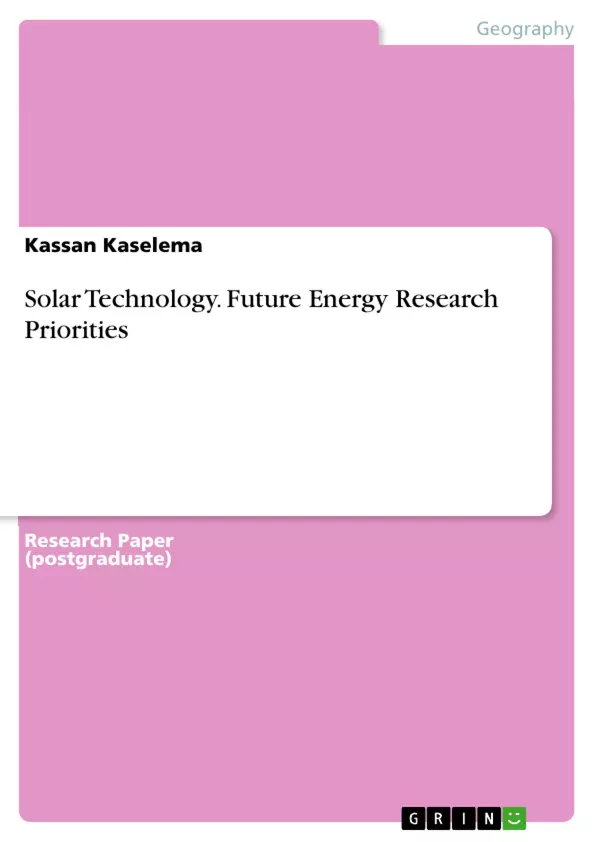The paper is developed with intentions to evaluate energy supply systems in African poorest countries and a comparison to those that have amicable energy systems. The focus is however emphasized on Malawi as the country is hardly hit by energy poverty, and its subsequent economic status currently ranked among top ten poorest African countries justify the goal to discuss on the renewable energy technology to be implemented as the matter of agency.
Malawi mostly relies upon biomass as a source of energy to either cook, light or even for industrial sector. With the increasing population growth which surpasses that of the world growth, currently at 3.3% as of august, 2014 statistical information, proves the need for a proactive approach towards combating energy situation which is currently sustained by intermittent supplement of ESCOM statutory company. The situation however is unreliable as the electricity supply is almost similar to disco lights thereby affecting industrial manufacturing service sector.
The research is mostly embarking on solar energy as the best priority and a room for research is being revealed. This is basically because solar energy is free and can be tapped directly as has been the case in the past where it has been used for drying animal skins and also dehydrating raw foods.
Inhaltsverzeichnis (Table of Contents)
- Acronyms and Abbreviations
- Executive Summary
- 1.0 INTRODUCTION
- 2.0 PROBLEM STATEMENT
- 2.1 Global trends in energy sector.
- 2.2 Barriers to solar energy technologies adoption..
- 3.0 RESEARCH OBJECTIVES
- 3.1 Main Objectives..
- 3.2 Specific Objectives..
- 3.3 Project Justification
- 3.3.1 Target group
- 3.3.2 Energy supply in Africa.
- 3.3.4 Prevailing Energy Systems.
- 4.0 LITERATURE REVIEW
- 5.0 STUDY METHODOLOGY
- 5.2. APPROACH.
- 5.3 SAMPLING..
- 5.4 DATA COLLECTION.
- 5.4.1 Interviews
- 5.4.2 Questionnaires..
- 5.4.3 Observations.......
- 5.5 DATA ANALYSIS
- 6.0 MILESTONES AND RESEARCH DELIVERABLES
- Bibliography
Zielsetzung und Themenschwerpunkte (Objectives and Key Themes)
This research aims to evaluate energy supply systems in the poorest African countries, comparing them to those with more favorable energy systems. The focus is on Malawi, a country severely affected by energy poverty. The goal is to discuss the implementation of renewable energy technologies, particularly solar, to address this pressing issue.
- Energy poverty in Malawi and its economic impact
- The need for alternative energy sources in Malawi
- The potential of solar energy technology in Malawi
- Cost-effective and feasible approaches to solar energy implementation in Malawi
- Evaluation of different solar energy systems and their suitability for Malawi
Zusammenfassung der Kapitel (Chapter Summaries)
The introduction provides an overview of the global energy demand and the challenges associated with meeting energy needs, particularly in Malawi. It presents a detailed description of Malawi's energy situation, emphasizing the reliance on biomass and the prevalence of electricity blackouts.
The problem statement delves into the global trends in the energy sector and identifies barriers to the adoption of solar energy technologies. It explores the reasons why solar energy systems often lack investment and policy support.
The research objectives outline the main and specific goals of the study, emphasizing the justification for focusing on solar energy in Malawi. It discusses the target group, the energy supply situation in Africa, and the prevailing energy systems in Malawi.
Schlüsselwörter (Keywords)
The research focuses on energy poverty, renewable energy technology, solar energy, Malawi, energy systems, cost-effectiveness, feasibility, and sustainable development.
Frequently Asked Questions
Why is Malawi a focus for solar energy research?
Malawi is severely hit by energy poverty and relies heavily on biomass. Solar energy is free and abundant, making it a proactive solution to combat unreliable electricity supplies.
What are the main barriers to solar technology adoption in Malawi?
Barriers include high initial costs, lack of policy support, and limited investment in renewable energy infrastructure compared to traditional sources.
How does energy poverty affect Malawi's economy?
Intermittent electricity supply (similar to "disco lights") negatively impacts the industrial manufacturing and service sectors, hindering overall economic growth.
What is the current primary source of energy in Malawi?
Most of the population relies on biomass (wood and charcoal) for cooking and lighting, which leads to environmental challenges.
What research methodology was used in this study?
The study utilized a mix of interviews, questionnaires, and observations to collect data on prevailing energy systems and potential solutions.
What are the specific objectives of this solar energy project?
The objectives include evaluating energy supply systems, identifying feasible solar technologies, and proposing cost-effective implementation strategies for the target groups.
- Arbeit zitieren
- Kassan Kaselema (Autor:in), 2019, Solar Technology. Future Energy Research Priorities, München, GRIN Verlag, https://www.grin.com/document/1158482



